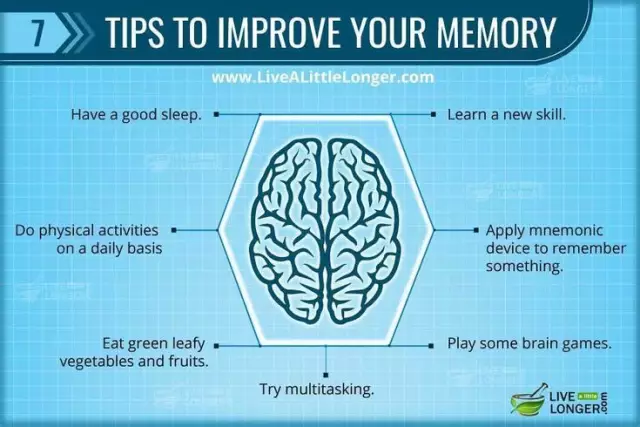- Author Rachel Wainwright wainwright@abchealthonline.com.
- Public 2023-12-15 07:39.
- Last modified 2025-11-02 20:14.
5 ways to boost your child's appetite
Poor appetite in a child is a complaint that pediatricians hear from almost every mother. Usually, refusal to eat is classified as a childish whim, but in some cases it can be an alarming symptom and cannot be ignored.
Chronic malnutrition is dangerous for the normal growth of a child: the results are weak immunity, decreased brain activity, memory impairment, frequent illnesses and even developmental abnormalities. For whatever reason it occurs, malnutrition is stressful for the body, while it lacks nutrients. Identifying the cause of the lack of appetite and eliminating it is an important task for parents and a pediatrician.
Eliminate diseases leading to loss of appetite
The first thing a mother should do when she is concerned about a child's lack of appetite is to rule out diseases. Sometimes food refusal is due to an acute or chronic illness. For example, loss of appetite often accompanies flu or acute respiratory infections as an indicator of the body's fight against infection. In this case, you do not need to insist on eating - after the child recovers, the appetite will return to normal.
In addition to colds, there are other diseases accompanied by refusal to eat:
- ascariasis. Loss of appetite is caused by intoxication of the body. Also, the child has rapid fatigue, increased salivation, irritability, restless sleep;
- dysbiosis. Imbalance in the intestinal microflora is a common cause of loss of appetite in children. At the same time, with dysbiosis, abdominal pain, flatulence, and stool disorders occur. After microflora normalization, as a rule, appetite is restored;
- anemia. Be careful! In addition to refusing food, a low level of hemoglobin in the blood is accompanied by weakness, dizziness, and pallor of the skin.
Also, the appetite in children worsens with liver disease, stomatitis, zinc deficiency or an excess of vitamin D. Therefore, if there are adverse symptoms accompanying poor appetite - pain, weakness, nausea, etc. - parents need to show the child to the pediatrician.

Source: depositphotos.com
Observe the diet
Eating disorders are the main cause of poor appetite in children. Often parents do not consider it necessary to follow such a regime: the child takes food uncontrollably, sometimes skips breakfast, overloads the stomach with food in the evening. Meanwhile, the lack of a meal schedule is a serious mistake that can lead not only to loss of appetite, but also to diseases of the digestive tract.
If the child eats at the same time, enough digestive juices are produced by the time of the meal, which stimulates the feeling of hunger. As a result, a healthy appetite appears and what is eaten is digested fully and quickly. If food intake is irregular, the secretion of digestive juices gradually decreases, as does appetite. To avoid this, it is recommended to follow a feeding regime, for example, the one used in kindergartens:
- 00-9.00 - breakfast;
- 00-13.00 - lunch;
- 00 - afternoon tea;
- 00 - dinner.
When eating, you should not rush or prolong your stay at the table. If a child eats on time, chews food thoroughly and adheres to the daily routine, alternating meals with activities and games in the fresh air, as a rule, there are no problems with appetite.

Source: depositphotos.com
Limit sweets
Very often, parents, driven by a desire to feed the child at all costs, encourage his whims and give him not healthy food, but what he wants at the moment. And children usually want something sweet. All foods containing sugar dull the feeling of hunger and permanently reduce the activity of the salivary glands. But although the child, having fortified with cookies, does not feel the need for other food, his body continues to need vitamins and trace elements from healthy foods. The solution is simple: do not allow the child to substitute sweets for a full meal, as well as "nibble" between meals. You should leave sweets for dessert. If you follow the diet, your appetite will be restored in a few days.

Source: depositphotos.com
To live an active lifestyle
Pediatrician E. O. Komarovsky believes that it is passivity that is often the root cause of a child's lack of appetite. Spending time in front of a computer or TV, children do not feel the need for large amounts of food, because their energy loss is minimal. Not needing nutrients, the body does not signal their lack of hunger, as a result of which the child eats sluggishly and reluctantly.
Outdoor games, outdoor activities cause considerable energy expenditure due to intense muscle activity. The body reacts to the expenditure of energy with an increased need for food. So, daily 1.5-2-hour walks in the fresh air, according to Komarovsky, in most cases save parents from children's whims at the table.

Source: depositphotos.com
Use folk remedies
Natural remedies used by our grandmothers can be useful in case of a child's poor appetite. If you do not want to eat due to low activity of gastric juice, you can use the following methods to stimulate digestive enzymes:
- drink 0.5 cups of apple juice 20 minutes before meals;
- chew the berries of chokeberry, barberry, sea buckthorn, anise seeds, caraway seeds before meals;
- fresh aloe juice with honey, take 1 tsp. 2-3 times a day before meals;
- raspberries, filled with 2 cups of hot water, take 0.5 cups 4 times a day before meals;
- infusions of dandelion root, yarrow, calamus, chicory take 0.5 cups before meals 3 times a day.
Remember: before giving your child any herbs and infusions, you must consult a pediatrician.

Source: depositphotos.com
YouTube video related to the article:

Maria Kulkes Medical journalist About the author
Education: First Moscow State Medical University named after I. M. Sechenov, specialty "General Medicine".
Found a mistake in the text? Select it and press Ctrl + Enter.






